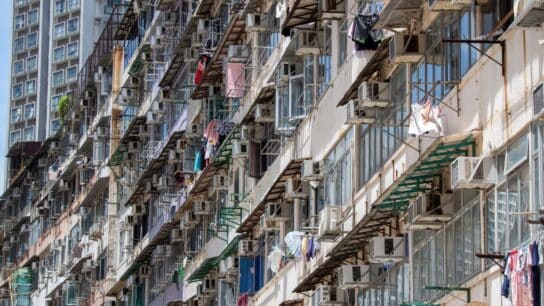Amidst the rustic charm of Mértola, a village nestled in Portugal’s Alentejo region, a transformative movement is taking root. At the heart of it all is the Proceso Regenerativo em Curso (PREC), a multifaceted establishment serving as a vegan haven, organic market, and communal hub for Terra Sintrópica members and allies. Led by the visionary Nuno Roxo, PREC stands as a testament to resilience and innovation, challenging traditional norms in a region where change is met with cautious optimism.
—
Even the butcher from across the street drinks his coffee here every day – at the vegans’ place. The Proceso Regenerativo em Curso (PREC), which translates to “Ongoing Regenerative Process,” is a place with many facets. It is a vegan canteen, café, organic store, food hub and meeting point for Terra Sintrópica members and helpers.
Located in Mértola, a picturesque village in the Alentejo region of Portugal with just under 5,000 inhabitants, Nuno Roxo, 48, has been running PREC for four years. Twelve years ago, he quit his steady job. “My family and friends thought it was completely crazy. In this region, a job is like life insurance. But I took the plunge – luckily!”
Nuno is a tour guide specialising in ecology, secretary of the Terra Sintrópica association, and manager of PREC. And most importantly, he is a local, and he wants to stay that way. In one of the most sparsely populated, driest regions in Europe, he is part of a small miracle. At PREC, they serve what the Terra Sintrópica people harvest fresh in the morning from the Malhadinha gardens, about 20 minutes outside of Mértola. A small Garden of Eden is thriving there – not by wresting anything from the arid, desert-like landscape but through cooperation. The focus is on regenerative agriculture grounded in the principles of syntropy.

The Wonderful Malhadinha Gardens
Marta Cortegano founded Terra Sintrópica in 2018: “We were in an extremely critical situation. We have practically had no rain for years, and people from the region were moving to the big cities – essentially as climate refugees. So we urgently needed to do something. That’s why I founded Terra Sintrópica together with Antonio Coelho, our farmer.”
When you walk through the Malhadinha gardens, it is hard to believe that the soil here is normally completely infertile. Lush spring onions, ripe potatoes, crisp salads, fragrant herbs. Alongside with juicy peaches, apricots, and pomegranates – all in the best organic quality. How is this possible?

A Complete Transformation
Coelho has been working as a farmer for 14 years. In his previous life, he planted monocultures and used plastic sheeting. But then came climate change, desertification, and the rain almost completely stopped.
He had heard about regenerative agriculture before but never thought he could apply it in his home region. He was inspired by Felipe Pasini, the co-founder of the “Living in Syntropy” association. Pasini is one of his most important mentors. Coelho learned from him to apply basic principles of syntropic agriculture: Always give back more to the earth than you take. Plant as many trees as possible – they store water, provide biomass, wood, and sugar. The sugar formed through photosynthesis is the basis for a fertile, living soil. Use different trees and plants – the more diversity and photosynthesis, the better. A very successful approach: “If you don’t work with monocropping systems, you get a higher yield per hectare because you are always harvesting something that was included in the system from the start,” Coelho told Earth.Org.

Of course, not everything always goes smoothly in the Malhadinha gardens. A completely new principle, a profoundly new way of thinking and working means experimenting, making mistakes, and having patience. When you, like Coelho, have to make a living from it, it is a big challenge. What sustains him – and this is not a cheap cliché in Mértola – is the community of Terra Sintrópica people: “The change in agricultural practices brought people and energy. This flow of ideas is not one-way. It’s a sense of belonging. Belonging to a group of people who have the same vision for this space and also for the territory.”
This includes not only the founders of Terra Sintrópica but also the many volunteers from all over Portugal and worldwide.
Supporting Through the Challenges
It is not easy in Mértola. As picturesque and idyllic as this Alentejo village is, its structures are very conservative.
PREC operator Roxo is well aware of this: “The Portuguese military dictatorship ended only 50 years ago; it still shapes people. Especially in rural structures like here. In Lisbon or Porto, it’s a different story. But we are here in Mértola. New ideas, in any field, need above all one thing here: A lot of patience,” he told Earth.Org.

But PREC and Terra Sintrópica receive support from the municipality. For several years now, there has been the Mértola Future Lab, which promotes ecology and sustainability. This includes ecological gardens and healthy cooking courses for elementary school children – the most sensible investment in the future generation. Behind this support is the very committed mayor, Rosinda Pimenta: “We can only make a difference here if we do it together with the citizens. They need to understand that we only have a chance if we completely rethink our approach to nature.”
The Future Is: Here!
For the people at Terra Sintrópica and in PREC, the rethinking has paid off.
“Neighboring regions are beginning to absorb our practices,” said Terra Sintrópica founder Marta Cortegano. “We can see this concept of regenerative agriculture spreading through the Alentejo. And the people we welcome here as volunteers are replicating this type of process all over the world.”
Roxo is also quite positive. He may not have gained money, but he has gained quality of life. He is happily married, has a daughter, and can give her what is most important: a future. And maybe the butcher from across the street will also try eating vegan soon.
This story is funded by readers like you
Our non-profit newsroom provides climate coverage free of charge and advertising. Your one-off or monthly donations play a crucial role in supporting our operations, expanding our reach, and maintaining our editorial independence.
About EO | Mission Statement | Impact & Reach | Write for us














